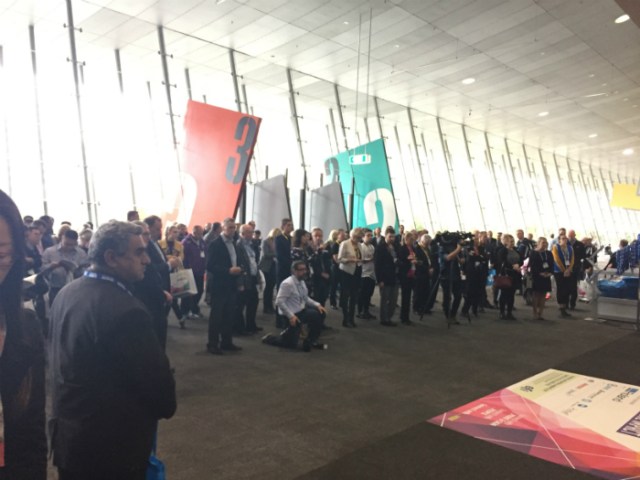
Right now most printers are facing skyrocketing power bills, and energy has risen to the top of the agenda of almost every printer in the country. The PIAA is in continuous conversations with the state and federal governments, and South Australian printers have been the victim of three blackouts. So the question is, why is this happening and how will it be fixed?
In March, ProPrint asked its readers “How concerned are you about the growing energy problem?” The majority of voters said they were concerned or very concerned about the issue, with only five per cent not having thought about it.
Since then an energy report by Pulp and Paper Edge named six issues directly impacting Australia’s pulp and paper industry, including securing base load electricity supply, access to affordable gas for conventional and unconventional sources and renewable energy certificates (REC) under the renewable energy target for thermal heat generation.
In June, Dr Alan Finkel delivered his report to the state governments (COAG) on the future of energy security in Australia, acknowledging the adoption of renewable energy has caused security and reliability problems, and suggesting any new provider of renewable energy must guarantee back-up supply for example, by battery and therefore reliability. The report also recommends a new over-arching bureaucracy – an energy security board to implement and coordinate national monitoring of security and reliability.
Currently, the ACCC is inquiring into electricity supply and prices with a preliminary report due to Treasurer Scott Morrison at the end of next month, and the final report due June 30 next year. But will this help the print industry or is it too late?
The Problem
Adelaide printer Terry Howe Printing Services was caught up in the South Australian blackouts but luckily for owner Terry Howe he didn’t get the full brunt of it.
“We lost a day and half of trading, most people were understanding about that and it took us a week to get back in order because you do lose time with that, plus staff going home caused us to lose money.
“Here in South Australia our electricity [price] is the highest in the country. Our business is in a position where we are fortunate enough to put in 140 solar panels on our roof with the rebate. If we were to do that without the rebate we would have to look in cutting costs to continue operating.”
Howe simply states, “If something isn’t done sooner rather than later it will affect costs. It is one thing to be competitive but when you have excess overhead continually rising out of control it is difficult.
“I would like to be in a situation when the process can be capped so we can deal with this and be profitable in the Australian market.”
One Melbourne based PIAA member will see its power bill reach unthinkable figures once its existing contract expires in December. Its bill will increase from $120,000 per year to $360,000 per year.
At the other end of the country Lotsa Print in Far North Queensland is seeing its power bills shoot up, even though it is managing to decrease its power consumption.Peter Martin – who has just sold the business – says it all began around six years ago when electricity prices were pushed up 20 per cent for a one off occasion but that one off occasion became a yearly event.
“Every year it is happening, it is incompetence by the government. The government keeps on increasing the prices so they can pay dividends to the government to help remove their debt. The bottom line – let’s face it is any public operation is not known for efficiency; the government department is useless.”
He says the daily average energy price used to be $256 and in 2015 it was $340. Martin says he dubbing himself as the groaner and not the owner because yelling ‘shut the bloody door’ is a daily occurrence for him when the air conditioner is on.
Martin says these rising prices are coming straight out of the company’s back pocket, “The price rises are basically coming off the bottom line. We can get a price increase and paper price increase and in this competitive market its coming off the bottom line, every increase. We cannot add those rises onto our invoices. And we need power, we are in North Queensland, we get 28C days in winter and we need the AC on all year for the machinery.”
Martin says Lotsa is the most efficient it can be yet the prices keep on climbing, “Three years ago a government audit happened where they came down to us and told us that we are so efficient – it is not funny. Balancing on the three phase power we turned the ACs up, we don’t turn them on as soon as we get to work, we wait a bit, we are really policing it, we have guys leaving early and I constantly tell them they can’t leave stuff on.”
Printing Industries CEO Andrew Macaulay is baffled that Australia has put itself in this situation, “It is insane a country like Australia which is richly endowed with energy – coal, gas and uranium – is in the position where we have got the fourth highest electricity costs in the world, and we are forecast to continue to see significant rises within the next three to four years. The direct impact on the printing sector both electricity and gas is that increases in energy input cost will have to be offset by labour force reduction, and when the printing industry is the largest manufacturer employer in the country. We are in the coal face of this problem.”
Macaulay highlights if this energy problem sticks around Australia could see a 10 per cent reduction in labour force, “It will be a direct impact on our economy, it is easier to manufacture products overseas, the inflection points leads business to move their whole manufacturing process overseas. The energy prices will lead us down this path, then all of a sudden we do not have a manufacturing workforce.
"Do we really want to be importing everything from overseas? The PIAA sees this as the single biggest issue facing the industry, as an economist it is the biggest issue facing economy. It is also starting become evident to householders and not just to business operators. It is crazy for us to not be looking at energy solutions, the state should not be getting away from its resposnsibility to provide orderly energy solutions.”
The solution
Peter Martin says all he wants the government to do is to fix the issue so there is realistic power prices, “The stupidity the government is going through when Australia has a huge natural resource from coal and gas. History has a wonderful way of summarising things, in another 30-40 years someone is going ask the question, what were they thinking? How can they have such huge resources and put themselves out for the market. What were they thinking, you know? They are idiots.”
Martin has gone as far as discussing the issue with the PIAA, who are also heavily involved in this issue, “I stated we need realistic power prices to the PIAA, they have been good, going down to Canberra and raising the issue. It’s a real issue in printing. Printing is a high intensity user of electricity, so they are pricing the domestic industry out of the market, and people are going overseas.”
In Adelaide Howe suggests legislation might be the answer for this issue, “I want them to have some sort of legislation to cap the high end users. It sounds a little bit discriminating but to cap the high end users or people that have employed 10 people or more in small businesses. They could also look at cost factor and reduce or give incentives, whether it be contract, capping price over three years, I am not sure if they would make the cost less and stop the increase.”
Martin will not bother contacting his local MP because he claims his representative Labor MP Billy Gordan keeps a low profile.
Macaulay says Printing Industries is in constant communication with state and federal governments, “We have been meeting with MP Josh Frydenberg on this subject and made recommendations directly to Frydenberg. Frydenberg is so tied to the Greens and the Paris Accord and he does not have a great grasp to the manufacturing factor, it is theoretical.”
Macaulay says “The Finkel report says the attitude of prime minister Turnbull is the obstacle, unless he gets out of his trendy inner city focus on renewable energy targets and focuses on reality – the country needs energy.
“It needs to be fixed in the immediate term, there is no reason why Australia should have inflating prices, no reason but bad public policy. They have been captured by the environmental lobby and the rent seekers in the renewable sector (solar, wind) looking for subsidised regular markets and they have got powerful lobby groups. The consequence is in South Australia the lights went out in the entire state, now it is heading towards that in NSW and Victoria.”
Macaulay claims the PIAA was the first organisation to raise the energy crisis with the government since October last year, however getting a response has been hard going, “It is like beating a head against brick wall. Industry players get increasingly concerned about the lack of government action.”
The plan
His plan is simple: make it an election issue at both the state and federal level and activate a members network where they can help the association by lobbying to state and federal ministers. Macaulay says PIAA membership feedback was clear, this is the top issue in our industry and the economy, “This is bigger than anything else the politicians are wasting time on.”
Howe hasn’t made contact with anyone in Printing Industries but says they need to look into bulk buying electricity.
He says, “We need to have a community buy for the printers and alike. I think in South Australia when you are getting more solar panels you should get more rebate. The current rebate is not paying for anything when you put in a $40,000-$50,000 system you think you want to pay it off to get a return from it.”
Macaulay seems to already be on the case with bulk buying electricity, although he hasn’t got a fully laid out plan yet, he says, “We are looking at a number of programs involving bulk buying. The bigger issue is getting federal and state politicians to deal with this issue seriously. It is a serious economic issue and not a social issue.”
Howe says, “Whoever has the solutions to make life a bit easier good for them, I will back them.”
Printers continue to face a challenging situation with power, Macaulay is correct in calling on print businesses around the country to front their MPs and tell them something has to be done otherwise industry and jobs will go from their electorates.
With their fat salaries and paid-for offices many MPs will pay scant regard to the price of power, however telling them it is going to impact their constituency may help jolt them into action. PP
Comment below to have your say on this story.
If you have a news story or tip-off, get in touch at editorial@sprinter.com.au.
Sign up to the Sprinter newsletter


